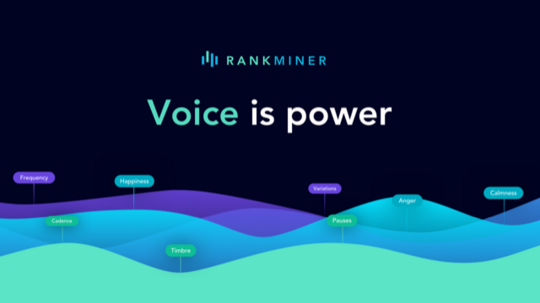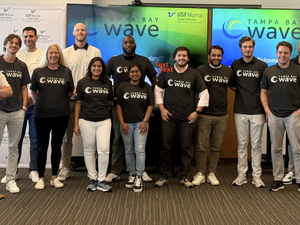
We’ve all heard the message before: “This call may be recorded for training purposes.” But most people don’t realize their voice may be used to train computers, not humans.
That’s the case with St. Petersburg startup RankMiner, which uses audio recordings to train its artificial intelligence algorithms.
RankMiner is a predictive voice analytics company founded in 2014 and launched commercially in 2018. The startup uses machine learning algorithms to analyze the intent behind a person’s voice, and aims to predict what that individual is likely to do based on that intent. Is the speaker mad, startled, nervous or aloof? Answers to this question may provide valuable insight into a company’s customers and employees.
“We live in a world of machine learning,” said Preston Faykus, RankMiner founder and CEO. “[At RankMiner], we apply a number of different approaches and algorithms to audio recordings, to analyze a person’s voice — not the words used but how they’re spoken.”
Consider the phrase, “I’m sorry.” Depending on the context, “I’m sorry,” could be a sign of frustration, annoyance, pity or sorrow. An “I’m sorry,” can be heartfelt and honest — a genuine apology — or it can be sarcastic and dismissive.
People are pretty good at picking up whether another person’s words are sincere. Computers are getting better at the task. Speech analytics technology has been around for well over a decade, but it’s made significant progress in accuracy over the last few years, as systems such as Siri and Alexa demonstrate.
The process works by having an algorithm listen to an audio recording of a voice, transcribe what it hears and then analyze vocal expressions (paralinguistic features, if you want to get technical). RankMiner analyzes hundreds of these expressions, which are often subtle but important. “I’m sorry,” “I’m sorry,” and “I’m sorry?” each mean very different things.
The value of speech analytics is worth more than revealing if someone is actually apologetic, said Faykus. His company uses the technology to help clients make decisions about their employees and customers. For example, a call center might use insights gained from RankMiner to determine whether the intent behind an employee’s voice might be associated with a positive or negative outcome. Perhaps the employee is stressed and likely to quit. Or maybe a customer is angry and considering canceling their service.
Faykus said RankMiner’s technology is language agnostic, meaning it can detect intent independent of the speaker’s language. The system is currently being used by companies in Hungary, South Africa and the United States.
RankMiner has raised $2 million in funding to date, said Faykus, and employs four full-time employees and two part-time employees.
Faykus acknowledged that customers might be wary of their voice being used to train machines, but said the company’s process is automatic and noninvasive: “We never listen to the phone calls. We don’t have humans evaluating the conversations. We don’t even take possession of the audio files themselves.”









